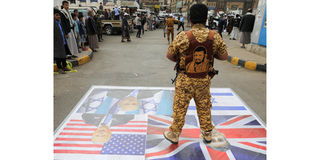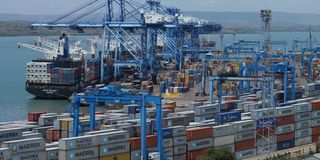
A Houthi policeman stands on a banner with pictures of Israeli Prime Minister Benjamin Netanyahu, British Prime Minister Rishi Sunak and U.S. President Joe Biden during a parade by Houthi recruits in a show of force amid a standoff in the Red Sea and U.S.-led airstrikes on Houthi targets, in Sanaa, Yemen, February 8, 2024.
Kenya says it is staying in the US-led international coalition to beat back at the Yemeni Houthi rebels, committing to a cause that guarantees certain US goodies but is also fraught with risks.
On a tour of Washington this week, Kenya’s Cabinet Secretary for Defence Aden Duale said Nairobi will continue playing on the side of the US when it comes to counter-terrorism and marine navigation safety.
And as shippers warned the cost of shipping to Mombasa might rise following the increasing insecurity from Houthi attacks on ships in the Red Sea, Kenya sustained its impression as the only Horn of Africa country to venture into the crisis.
The Kenya Ships Agents Association (KSAA) warned that importers should expect higher charges from this week anything to go by as stakeholders assess the increasing insecurity situation.
At the Pentagon, the headquarters of the Department of Defence in Virginia State, Duale said Kenya is seeking adequate safety for ships heading into its ports and the coalition offered a better bet.
“I want to assure you, Secretary of Defense, that Kenya supports the ongoing effort in ensuring freedom of navigation and the safety of the maritime traffic in the Red Sea (inaudible) on the Gulf of Aden,” said Mr Duale at a joint event with his US counterpart Secretary Lloyd Austin III.
“Kenya, therefore, remains committed to the US-led initiative under Operation Prosperity Guardian, and I had the opportunity to join you at your virtual -- initial virtual meeting that you held this year, which I participated in. Kenya, therefore, remains a serious partner in that Operation Prosperity Guardian.”
The US, UK and other friendly countries teamed up in January to launch strikes against multiple Houthis targets in Yemen after Houthis started attacking ships linked to Israeli businesses, a supposed protest against the war in Gaza between Israel and Hamas.
“In response to continued illegal and reckless Houthi attacks against vessels transiting the Red Sea and surrounding waterways, the armed forces of the United States and the United Kingdom, with support from Australia, Bahrain, Canada, the Netherlands, and New Zealand, conducted additional strikes against eight targets in Houthi-controlled areas of Yemen,” a joint statement issued by the British prime minister’s office said.
Kenya has since joined a group of countries opposed to Houthi attacks, becoming only one of the two African countries to do so (the other is Guinea Bissau). The US also sanctioned Houthis and re-categorised them as terrorists.
Duale’s US trip was a follow-up to Austin’s earlier visit to Nairobi last year when Houthis weren’t a threat yet. Yet it offered assurances of a composite defence cooperation. Kenya already grants the US access to critical air and post facilities, part of a previous bilateral arrangement.
“In the War against Terrorism, we have partnered and we have also shared intelligence and also, again, now in maritime security space,” Duale admitted. Kenya had been a beneficiary of an EU-led coalition against sea piracy off the coast of Somalia, seeing incidents drop significantly in a decade from 2012. But the war in Gaza has offered groups, including Somali pirates a chance to regroup. In December, the EU Naval Force reported the hijacking incident of a Maltese-flagged ship MV RUEN which was hijacked off the Somali coast while transporting metals from, South Korea. It raised security concerns once again.
Kenya says it will remain “a key strategic partner in tackling a range of shared threats and advancing security in East Africa and beyond,” including violent extremism and other vices.
Austin said Kenya is critical for offering its territory as a launch pad for security programmes in the region.
“And as always, we're grateful for Kenya's generosity in hosting US forces at Manda Bay. Our partnership deepens our ability to deter threats and to combat global terrorism and provide humanitarian assistance when needed,” he said.
Kenya has paid the price before though, becoming a target of terrorist groups for being US-ally, including the 2019 Dusit D2 attack and a previous attack on Manda Bay airbase. On the Houthi issue, all the Horn of Africa countries including Somalia, Djibouti and Eritrea stayed away from the anti-Houthi coalition.

Containers at the port of Mombasa, Kenya. PHOTO | COURTESY
Yet Kenya is banking on a recent bilateral arrangement to run from 2023 to 2028 to profit from US defence technology and innovation and improve responses to emerging security challenges.
The US has been providing crucial intel and even protective gear to Kenyan troops.
The two leaders also agreed to continue working together to address shared regional challenges.
Juma Ali Tellah, the Chief Executive Officer of KSAA took issue with the escalating conflict along the Red Sea route, and its potential repercussions on the business community and consumers in East Africa.
The worry was always expected to bring a new burden.
But the actual cost increment wasn’t known since December when Houthis first fired the first missile.
Kenya says it will stay in the US-led international coalition fighting Yemen's Houthi rebels, committing itself to a cause that guarantees certain US goodies but is also fraught with risks.
On a trip to Washington this week, Kenya's Defence Cabinet Secretary Aden Duale said Nairobi would continue to side with the US on counter-terrorism and maritime security.
As shippers warned that the cost of shipping to Mombasa could rise due to increased insecurity caused by Houthi attacks on ships in the Red Sea, Kenya maintained its impression as the only Horn of Africa country to venture into the crisis.
The Kenya Ships Agents Association (KSAA) warned that importers should expect higher charges from this week as stakeholders assess the growing insecurity.
At the Pentagon, Department of Defence headquarters, Duale said Kenya was seeking adequate security for ships entering its ports and that the coalition offered a better bet.
"I want to assure you, Secretary of Defence, that Kenya supports the ongoing efforts to ensure freedom of navigation and safety of maritime traffic in the Red Sea (inaudible) in the Gulf of Aden," Duale said at a joint event with his US counterpart, Secretary Lloyd Austin III.
"Kenya therefore remains committed to the US-led initiative under Operation Prosperity Guardian, and I had the opportunity to join you in your virtual -- first virtual meeting that you held this year, which I attended. So Kenya remains a serious partner in this Operation Prosperity Guardian.

Crew members from the USS Dwight D. Eisenhower conducting flight operations in response to increased Iranian-backed Houthi malign behavior in the Red Sea on January 22, 2024.
The US, UK and other friendly countries teamed up in January to launch strikes against several Houthi targets in Yemen after the Houthis began attacking ships linked to Israeli companies in an alleged protest against the Gaza war between Israel and Hamas.
"In response to continued illegal and reckless Houthi attacks on vessels transiting the Red Sea and surrounding waterways, the armed forces of the United States and the United Kingdom, with support from Australia, Bahrain, Canada, the Netherlands and New Zealand, conducted additional strikes against eight targets in Houthi-controlled areas of Yemen," a joint statement from the British Prime Minister's Office said.
Kenya has since joined the group of countries in opposing the Houthi attacks, becoming one of only two African countries to do so, the other being Guinea Bissau. The US has also sanctioned the Houthis and re-listed them as terrorists.
Duale's US trip was a follow-up to Austin's earlier visit to Nairobi last year when the Houthis weren't yet a threat. But he offered assurances of defence cooperation. Kenya already allows the US access to critical air and port facilities, part of an earlier bilateral agreement.
"In the war on terrorism, we have been partners and we have also shared intelligence and now again in the maritime security space," Duale acknowledged. Kenya has benefited from an EU-led coalition against maritime piracy off the coast of Somalia, which has seen a significant drop in incidents in the decade since 2012. But the war in Gaza has given groups, including Somali pirates, a chance to regroup.
In December, the EU naval force reported the hijacking of the Maltese-flagged MV RUEN, which was hijacked off the Somali coast while carrying metals from South Korea. This has again raised security concerns.
Kenya, he said, "remains a key strategic partner in addressing a range of common threats and advancing security in East Africa and beyond," including violent extremism and other vices.
Austin said Kenya was critical in offering its territory as a launch pad for security programmes in the region.
"And as always, we're grateful for Kenya's generosity in hosting U.S. forces at Manda Bay. Our partnership deepens our ability to deter threats, combat global terrorism, and provide humanitarian assistance when needed," he said.
However, Kenya has paid the price before, becoming a target of terrorist groups for being a US ally, including the Dusit D2 attack in 2019 and an earlier attack on the Manda Bay airbase. On the Houthi issue, all Horn of Africa countries, including Somalia, Djibouti and Eritrea, have stayed away from the anti-Houthi coalition.
However, Kenya is banking on a recently signed bilateral agreement, which runs from 2023 to 2028, to benefit from US defence technology and innovation, and to improve its response to emerging security challenges.
The US has provided critical intelligence and even body armour to Kenyan troops.
The two leaders also agreed to continue working together to address common regional challenges.
Juma Ali Tellah, Chief Executive Officer of KSAA, raised the issue of the escalating conflict along the Red Sea route and its potential impact on East Africa's economy and consumers.
The worry was always going to be a new burden.
But the actual cost increase hasn't been known since December when the Houthis fired the first missile.
"Despite efforts to normalise freight rates following events such as the Covid-19 pandemic and the Russia-Ukraine war, the ongoing attacks by Houthi rebels pose an ongoing challenge."
Major shipping lines, including those represented by KSAA, are responding by rerouting ships around the Cape of Good Hope, a costly alternative that directly impacts the business community and consumers in East Africa," said Mr Tellah.
"The diversion of vessels will result in longer shipping distances, which will lead to an increase in freight rates and disruptions in the supply chain. Delays in the smooth movement of goods are expected due to extended transit routes".
Mr Tellah also said the attacks would have a long-term impact on the freight business, given the delay in the reshipment of empty containers.
"We have seen a reduction in the number of vessels, resulting in a reduction in vessel capacity and container availability, as well as the potential for an increase in insurance costs and liability for ship owners and insurers," the CEO said.
The Red Sea has remained a major concern for shippers, resulting in vessels being rerouted to take a longer route via the southern part of Africa, while some vessels are attempting to mask their positions by pinging at other locations as a safety precaution when entering the Yemeni coastline.
The announcement comes days after industry associations such as the Baltic and International Maritime Council (BIMCO), one of the largest international shipping lobbies representing shipowners, and the International Chamber of Shippers (ICS) issued security guidelines for navigating the southern Red Sea and Gulf of Aden.
The guidance follows a series of threats and attacks by the Houthis.









